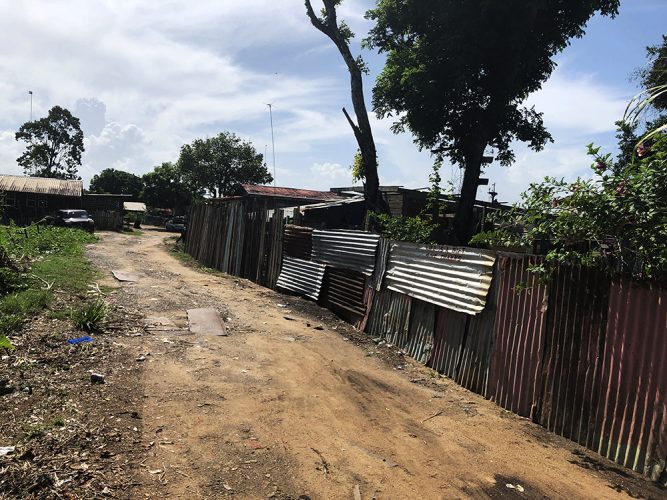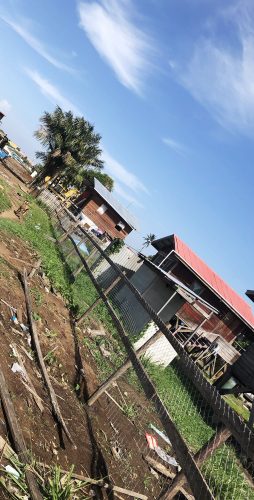By Shuntel Glasgow
Nearly a year after Stabroek News reported about the dire condition of people living on the Parika Sea Dam, a promise to relocate them is still to be fulfilled but many are now making themselves more comfortable by improving their surroundings on what is a sea defence reserve.
About 47 families reside on the Parika Sea Dam. There is neither electricity nor running water, the road in is virtually impassable, sections of the area are swampy, and most of the dwellings are makeshift houses and shacks. However, while many there are desperate for better living conditions, others have managed to make themselves comfortable in the environment.
Stabroek News paid a visit to the Parika Sea Dam last week, and met with Ramesh Takah, a 45-year-old man who has lived in a dilapidated house for the past 20 years with his wife and four children. Takah, who is diabetic, sat on his veranda with a bandaged toe and explained that his life has been bittersweet for years. He had lost his vision last year because of glaucoma, and underwent laser surgery which allowed him to see objects close to him. This was a happy moment for the family until his daughter fell sick. The nine-year-old suddenly began experiencing severe knee pain, and now can only walk short distances.

The father recalled that when he returned from doing the surgery in Trinidad, he was excited to see again but upon arrival home, the nine-year-old began complaining about pain in the knee that was accompanied by swelling. She was taken to the West Demerara Regional Hospital and received pain tablets. It was deemed as minor until she fell while walking home from school one day. The 9-year-old’s knee was x-rayed and from his explanation of what doctors said it appeared to be osteoarthritis. Takah said he was focused on providing for his family when he returned but he was advised by the doctors to stay away from heat.
Takah is still hopeful for a better life although he remarked, “Things not so bad like before, but I want a better life nah.” To provide for the family, Takah and his wife would usually sell beverages from their home and guard boats at night.
Sattie Sanichar, a single mother living on the sea dam for 15 years, was quite dissatisfied since she was hopeful when the Minister of Housing and Water, Collin Croal, visited earlier this year and announced that they will be relocated but nothing has happened. Sanichar, a domestic worker, pointed out that life is difficult with the continuous rise in prices for food.
Life, however, took a good turn for Pamela Paul, a shop owner, who explained that she is now comfortable on the sea dam because her house is no longer shabby and the yard is covered with sand and concrete. Moreover, electricity is no longer an issue for her since the family has been using generators and solar panels. And while there is no running water in the area, they would buy water from a truck that will fill their tank allowing them to complete their domestic chores. Paul noted that government officials would visit the area occasionally and more often when it’s closer to general or regional elections. She pointed out that the residents in the area are living on promises which for many of them are yet to become reality. They feel neglected as a people since developmental works could be seen in other parts of the country but it seems as though they are excluded.

“Last year they went here and during election time and they promise us. When they need us, they come and when them done it not coming through.”
Hardship has gripped a mother of one who lives with her fiancé and 10 others in a yard. Sabrina Kattow, a 23-year-old, is housed in a shack with her baby. Kattow is dependent on her fiancé who is a labourer on a boat. She described her life as “hard” since the river water is used to wash clothes and bathe. The woman stated that her passion for a better life grew after the minister visited but it was shattered by the subsequent silence and neglect. She felt ashamed to say that drinking water is expensive as she explained her situation, but is still hopeful that one day they will be relocated.
“If they come one day and say that we will be moved to a better place, I would be happy since it will be a better environment for my child to grow up. I just want the best for him.”
While they all wish for access to electricity and water, the area cannot be regularized because it is considered part of the coastal sea defences and the Sea Defence Act prohibits persons from occupying sea defence reserves.
From shabby homes and poverty to better living conditions, says Shonnette Graham, a 35-year-old mother of eight who has lived on the Parika Sea Dam for 20 years. Graham stated that she applied for a house lot since 2011 and is yet to receive an update on the current status. The woman related that she is comfortable on the sea dam since she uses solar panels along with a generator to provide electricity. Despite the odds, such as the swamps and minor flooding during the high tide, the woman explained that relocating will be difficult since she no longer lives in a shabby home. “We make ourselves comfortable because we use the river water to wash clothes, we bathe with rain water and buy water to drink. We have solar and generator so we comfortable. Life was difficult years ago but we start getting things to make us comfortable”, she said.
The residents told this newspaper that notices and visits from the Ministry of Housing and Water have been a norm for years on the Parika Sea Dam. Almost everyone living there had been asked to fill out forms earlier this year for house lots during a visit by Minister Croal. The ministry began demolishing unoccupied houses along the Parika Sea Dam in March.
Croal had told this newspaper that the area being occupied by the squatters is a sea defence reserve and asserted that the sea defence must be maintained. “It’s about doing the right thing; they can apply for house lots. There is a regional office in Region Three [where] they can visit the office. We cannot regularise the sea defence”, he said.






